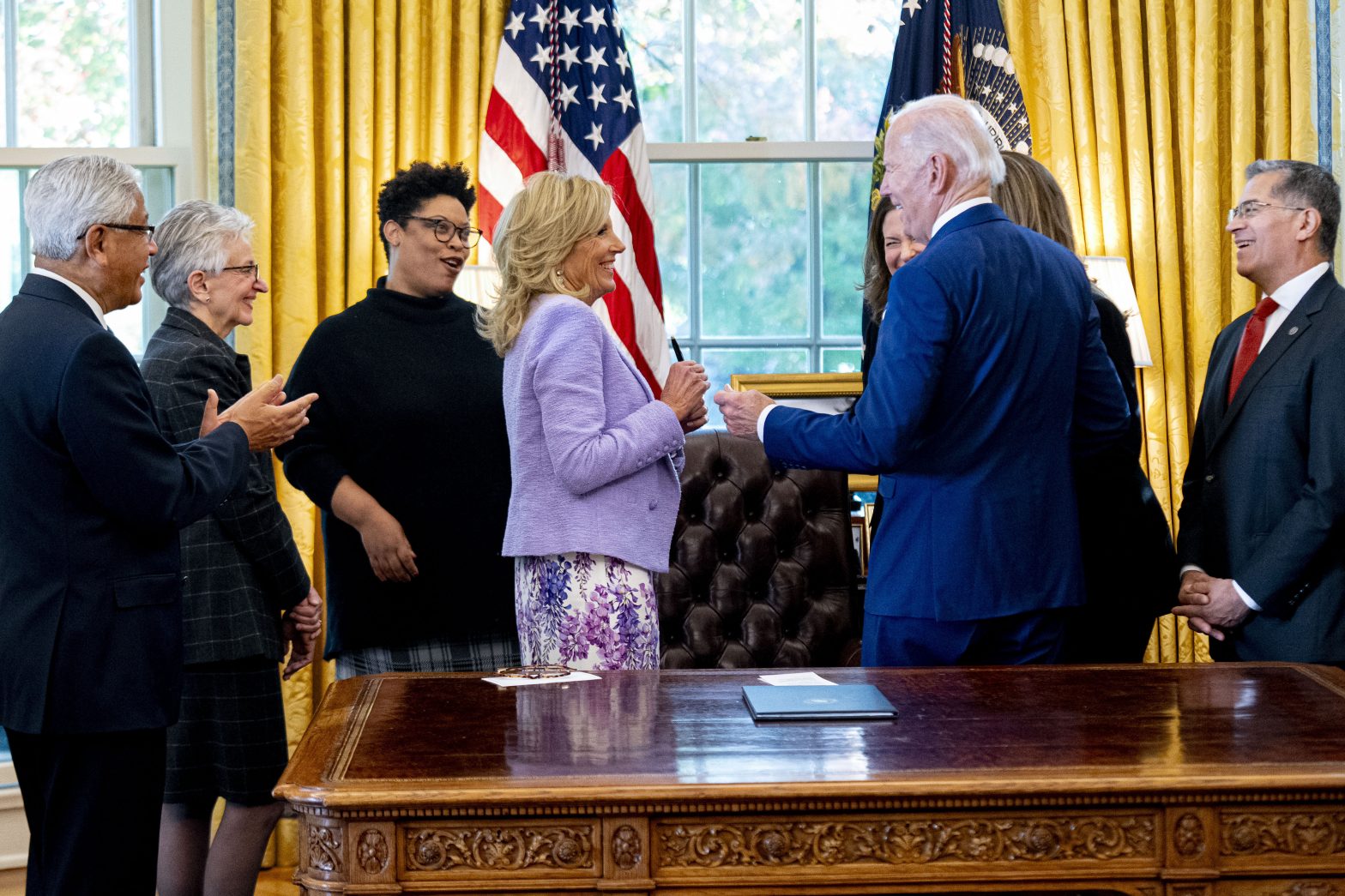New White House Initiative Puts Women’s Health Research at Forefront

WASHINGTON — A new initiative announced by the White House this week aims to fundamentally change how the nation approaches and funds research into women’s health, closing a gender gap that has long had serious consequences for more than half the U.S. population.
The new White House Initiative on Women’s Health Research is the result of extensive groundwork laid by First Lady Dr. Jill Biden and the White House Gender Council.
It will be chaired by Dr. Carolyn Mazure, the Yale professor who established the university’s Women’s Health Research facility, a gender-specific research facility, 25 years ago.
“If you ask any woman in America about her health care, she probably has a story to tell,” Biden said during a briefing call with reporters on Monday.
“You know her. She’s a woman who gets debilitating migraines, but doesn’t know why and can’t find treatment options that work for her. She’s the woman whose heart disease isn’t recognized because her symptoms are considered noncardiac and the traditional testing used to diagnose a heart attack was developed based on men,” she continued.
“She’s the woman going through menopause, who visits with her doctor and leaves with more questions than answers. Every woman, half of the population, will be affected by menopause. And yet there’s a stunning lack of information about how to manage and treat its symptoms, which can be debilitating.
“Research on women’s health has been underfunded for decades. And many conditions that mostly or only affect women, or affect women differently than they do men, have received little to no attention,” the first lady said. “Because of these gaps, we know far too little about how to manage and treat conditions like endemic endometriosis, and autoimmune diseases like rheumatoid arthritis.
“And these gaps are even greater for communities that have historically been excluded from research, including women of color and women with disabilities,” she said.
Biden said the need for a new effort to address these disparities was brought to her attention earlier this year by Maria Shriver, the former journalist and first lady of California, and a longtime women’s health advocate.
“We met and we spoke about the need for an effort inside and outside of government to close these gaps, and what Maria shared immediately resonated with me,” Biden said.
The first lady said when she repeated Shriver’s message to the president, she immediately had a sympathetic ear.
“He listened. And then he took action,” she said. “That is what he does — he learns about a problem and then he gets to work tackling it. He doesn’t waste any time,” she said.
Like other Biden administration initiatives, the women’s health effort will be undertaken with a “whole of government” approach.
In addition to relying on various offices of the White House itself, like the Office of Management and Budget and Office of Science and Technology Policy, the new effort will draw on the expertise of departments of Health and Human Services, Defense and Veterans Affairs.
The president’s order directs initiative participants to get a report on his desk within 45 days laying out concrete actions the White House can take both in regard to targeted research and funding.
The initiative has also been directed to explore new public-private partnerships and engage private and philanthropic leaders to drive innovation and ensure the combined power of the public, private and philanthropic sectors to advance research on women’s health.
“This is a really, really big deal,” Shriver said. “It’s a big day for every woman in this country, no matter her age, her political affiliation, religious identity or ethnicity. And it’s a game-changing day in that from this moment on women’s health really will move out of obscurity and be elevated out of obscurity.
“The bottom line is we can’t treat women or prevent them from becoming sick in the first place, if we have not invested in funding the necessary research. That changes today,” Shriver said.
Mazure said in her years at Yale University, she’s had the opportunity to see Women’s Health Research become a recognized field of study that spans all health conditions experienced by women.
“In the mid 1990s, the National Institutes of Health, the largest public funder of biomedical research in the world, created a sea change in science when it began requiring that women be included in NIH-funded clinical research,” she said, adding “at that time, women were largely excluded from study participation.
“It is time once again to make change by accelerating and strengthening our efforts to study women’s health. Because the data are clear as to the dramatic need to learn more about the health of women. For example, women are at higher risk for chronic disease and disability, for acute and chronic pain syndromes and to die following a heart attack. Women are also at higher risk for adverse effects of treatments. … These data are our call to action.
“What is empowering is that we can change this, we have already shown that we can change the landscape of research, advance science and improve outcomes. And we must apply the same resolve working with all stakeholders to accelerate research that informs us about these and other critical areas of the health of women,” she said.
During the Q&A session that followed the announcement of the initiative, a senior administration official picked up on Mazure’s mention of the NIH, stressing that the new initiative was not a replacement or substitute for the agency’s ground-breaking work in the area of women’s health.
“We launched this initiative because we recognized that there’s still a long way to go,” the official said. “Research and information gaps are still too big, and they persist when it comes to issues that impact women’s health.
“We established the White House Initiative on Women’s Health Research to ensure that the administration, from the National Institutes of Health to the Department of Defense, is doing everything it can to spark innovation and close research and treatment gaps for women,” they continued,
“As the largest public funder of biomedical research in the world, the NIH and its Office of Women’s Health Research, will continue to be key partners in this work. But the initiative is intentionally broader in scope than NIH and also includes partners in women’s health research across the federal government.
“Our goal is to set strategic priorities, break down silos and improve coordination among the many agencies and offices across the federal government in regard to this important issue,” the official said.
Dan can be reached at [email protected] and at https://twitter.com/DanMcCue

























